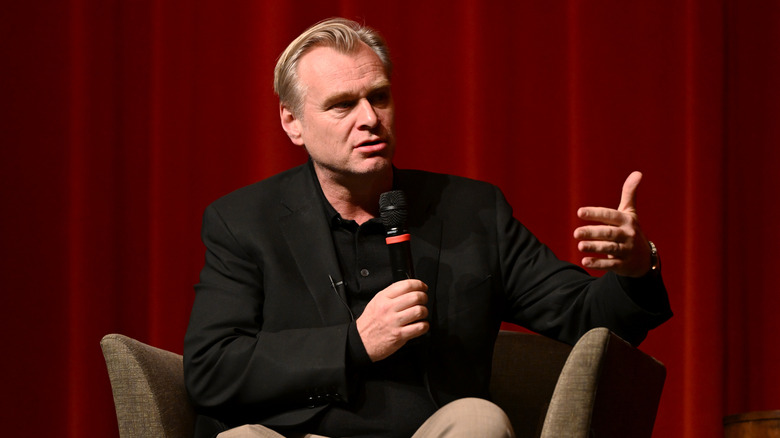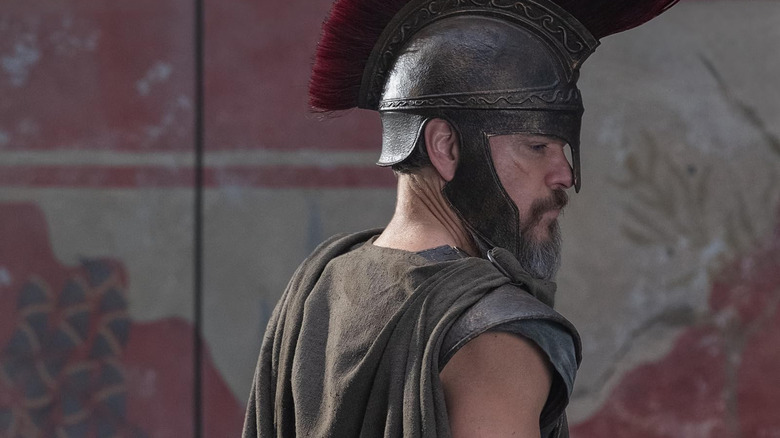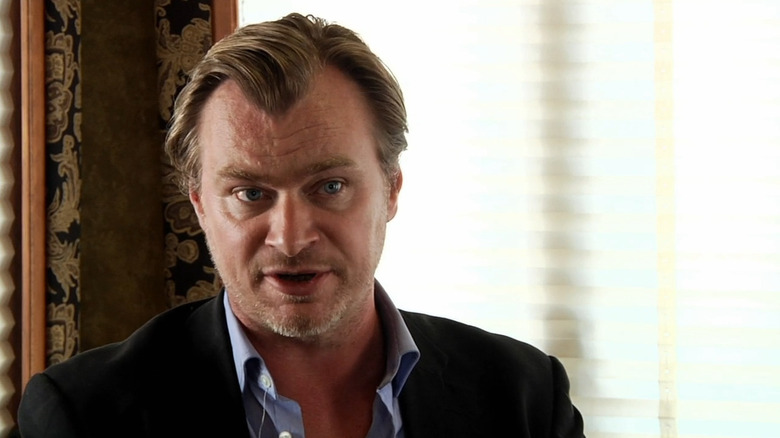Christopher Nolan's The Odyssey Filming Controversy Explained
Christopher Nolan's film adaptation of Homer's "The Odyssey" is currently shooting on location all around the world. Matt Damon is playing Odysseus, with Tom Holland portraying Odysseus' son, Telemachus. In addition, Charlize Theron is reported to be playing Circe, while the film boasts a giant cast of huge celebrities, including Zendaya, Anne Hatheway, Lupita Nyong'o, Robert Pattinson, John Leguizamo, Elliot Page, Will Yun Lee, Mia Goth, and many others besides. Filming has taken place in Aït Benhaddou, Morocco, and various locations around Greece. Some scenes were filmed on Sicily, and others were filmed in the woods of Scotland or at a studio in Los Angeles. It appears that Nolan wanted to re-visit the real locations of the Mediterranean where "The Odyssey" takes place. Well, Scotland and L.A. notwithstanding.
According to a new report from Deadline, however, Nolan has filmed "The Odyssey" in a location that is politically problematic. Zendaya and Damon shot a few of their scenes recently in the region of Western Sahara near the city of Dakhla. This area of the world has been declared a "non‑self‑governing territory" by the United Nations, a designation it was given way back in 1963. Actual sovereignty of Western Sahara — a sparsely populated area of 600,000 people — has long been disputed. Western Sahara has been militarily occupied by Morocco, but Morocco hasn't been internationally recognized as the rightful ruler of the area. That's to say, the native Sahrawi population are being repressed.
Recently, though, the United States and the UK have claimed that Western Sahara is part of Morocco. Big U.S. and UK movie studios have even been negotiating with the Moroccan government to film there, leading to controversy and a tacit approval of Morocco's occupation of the area. Now, by shooting "The Odyssey" in Western Sahara, Nolan has — perhaps unwittingly — given credence to the military occupation and the oppression and erasure of the Sahrawi people.
Christopher Nolan is filming The Odyssey in Western Sahara, a contested area of Northern Africa
Deadline pointed out that the Amazon series "The Wheel of Time" also previously filmed scenes in Western Sahara, outraging the board of the Western Sahara International Film Festival (or FiSahara). Although filmmakers are likely just looking for faraway and beautiful locales, the politics of their choices are insensitive. FiSahara released a statement on the matter, saying:
"Dakhla is not just a beautiful location with cinematic sand dunes. Primarily, it is an occupied, militarized city whose indigenous Sahrawi population is subject to brutal repression by occupying Moroccan forces. [...] By filming part of 'The Odyssey' in an occupied territory billed as a 'news black hole' by Reporters Without Borders, Nolan and his team, perhaps unknowingly and unwillingly, are contributing to the repression of the Sahrawi people by Morocco."
FiSahara seems to be giving Nolan the benefit of the doubt, understanding that the plight of the Sahrawi people is not well-perpetuated among Western news sources. Nolan may not know that the Sakrawi people can't make their own movies. This, of course, inspired FiSahara to make the statement in the first place. It continued:
"We are sure that were they to understand the full implications of filming such a high-profile film in a territory whose indigenous peoples are unable to make their own films about their stories under occupation, Nolan and his team would be horrified. Morocco routinely touts Sahrawi cultural expressions as uniquely Moroccan. They created a film festival in Dakhla to counter ours and produce high-budget films that portray Western Sahara as part of Morocco. However, Sahrawis trying to make films about their lives are persecuted and must work clandestinely and at great risk to themselves and their families."
One might think Nolan, when being made aware of this, would understand what his locations meant.
The history of Western Sahara
The issue was elucidated upon further in a recent report from The Guardian. Western Sahara was under the occupation of Spain until the government pulled out in 1976. Morocco then annexed the country and has been occupying it ever since. The UN, as mentioned, noted that Western Sahara is not officially ruled by Morocco, but that it doesn't have its own official government yet either. According to the Office of the United Nations High Commissioner for Human Rights, no reporters have been allowed in the territory for the last nine years, and allegations have arisen that the Moroccan government is intimidating, observing, and discriminating against the Sahrawi people.
Amnesty International has also written reports on the oppression of the Sahrawi people, while Reporters Without Borders have noted that no one ever gets to go there to get the full scoop. It is, in their words, a desert for journalists.
The concern about shooting a high-profile feature film like "The Odyssey" in Western Sahara is that it may be a whitewashing of the repression. If a major Hollywood studio can write off on the oppression, then some may assume that it's not so big a deal. Fans are more interested in Nolan's craft and other "Odyssey" movies.
The shoot in Dakhla lasted a mere four days, and Nolan had already moved his production out of the territory before FiSahara made its statement (as noted by The Guardian). Universal has not yet said anything about the topic, and Nolan hasn't gone on record on the matter. Further bulletins will be posted as events warrant.
"The Odyssey" opens in theaters on July 17, 2026.


